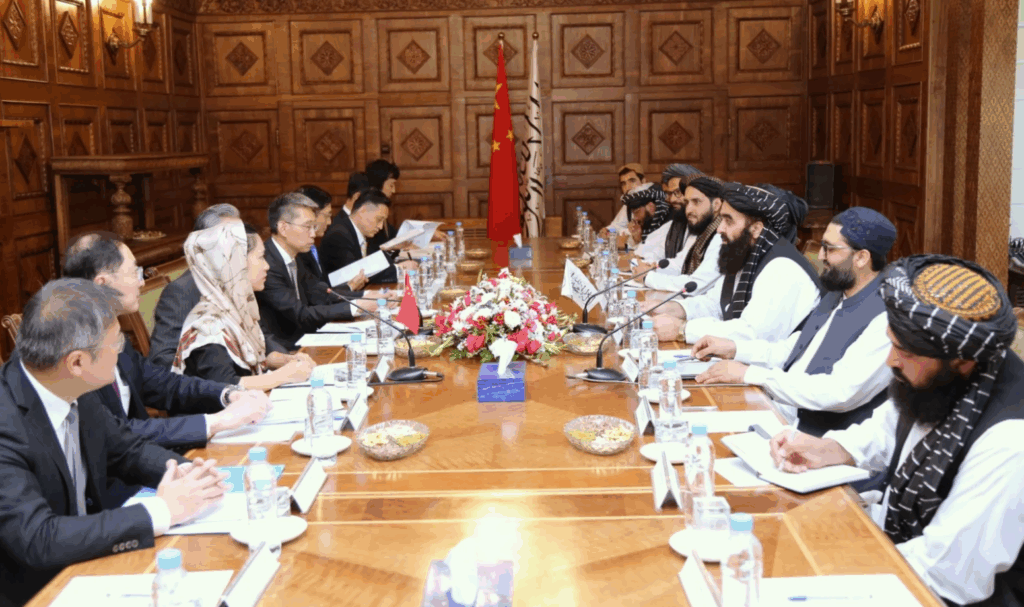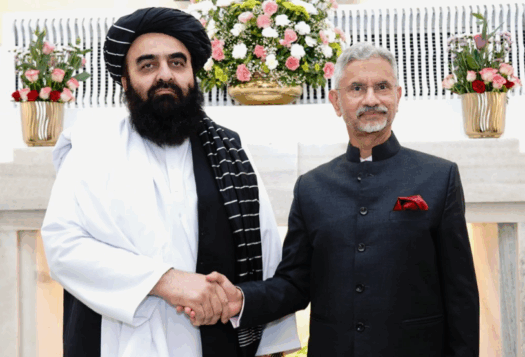
In early July, Russia became the first country to formally recognize the Taliban regime in Afghanistan. This recognition followed an April 2025 ruling by Russia’s Supreme Court to delist the Taliban as a terrorist organization.
Russia’s recognition signifies a major diplomatic achievement for the Taliban regime and underscores an evolution in Russia’s role from a regional power to a direct stakeholder in Afghanistan’s political trajectory. The recognition serves a blend of security, economic, and geopolitical objectives for Moscow. The move also reshapes regional dynamics in South and Central Asia, establishing Russia as a significant player in the region in the West’s absence and countering Moscow’s diplomatic isolation in the wake of the war in Ukraine. For other countries in South and Central Asia with interests in Afghanistan—including India and China —Russia’s expanded role presents both challenges and opportunities.
Drivers of the Shift
Russia’s involvement in Afghanistan dates back to the Soviet invasion of the country (1979-1989), during which it fought mujahideen fighters, some of whom later joined the Taliban. After the Soviet withdrawal in 1989, the Russian Federation supported the anti-Taliban Northern Alliance and formally designated the Taliban as a terrorist organization in 2003.
Moscow’s position on the Taliban has undergone a significant shift since then, especially after the group’s return to power in Afghanistan in August 2021. Initially, Moscow kept its distance, limiting its engagement with the Taliban to multilateral platforms addressing security concerns such as counterterrorism and regional stability. Over time, however, this cautious stance shifted as Russia’s influence in the Middle East declined, particularly following setbacks in Syria and Iran. Under these changed circumstances, Moscow began to view engagement with the Taliban as a key opportunity to regain regional leadership in South and Central Asia, reinforcing its international influence despite diminishing prospects in the Middle East.
Moscow began to view engagement with the Taliban as a key opportunity to regain regional leadership in South and Central Asia, reinforcing its international influence despite diminishing prospects in the Middle East.
The primary driver of Moscow’s engagement with the Taliban is counterterrorism. The attack on the Crocus City Mall in Moscow in March 2024, which claimed over 130 lives and was carried out by Islamic State-Khorasan Province (ISKP) militants, marked a turning point in Russia’s relationship with the Taliban. Given the Taliban’s de facto control over Afghanistan, Russia recognized their common interest in opposing ISKP’s terrorist operations. At UN-mediated negotiations in Doha in 2025, Russian ambassador Zamir Kabulov called the Taliban an “objective partner” in the fight against ISKP and terrorism. Taliban members have been increasingly participating in the Moscow Format and other initiatives by Russia. Separately, Moscow also aims to engage with the Taliban to cooperate on coordinated action against organized crime and drug trafficking.
In formally recognizing the Taliban, Russia also hopes to tap into various economic opportunities. Five Memoranda of Understandings were signed by Russia and Afghanistan at the Kazan Forum in May 2025, focusing on cooperation in infrastructure, transportation, and energy. The Trans-Afghan Railway—which would connect Central and South Asia—is currently being assessed for viability, with findings expected in early 2026. Moscow is also supporting the integration of Afghan routes into its North-South Transport Corridor (INSTC), as well as the development of the Termez–Herat–Kandahar railway project. Trade offers further opportunities. At present, Afghanistan imports over USD $200 million worth of Russian wheat and petroleum products each year. Negotiations are underway to expand this trade further, including the use of local currencies to reduce dependence on the U.S. dollar. Russia also plans to bring skilled Afghan workers into sectors such as agriculture and construction, potentially scaling from about 100 workers currently employed to 1,000 under a June 2025 agreement.
Strengthening Russia’s Position in Central Asia
Moscow’s motivations for recognizing the Taliban track closely with Central Asian nations’ security- and connectivity-focused engagement with the regime. Russia and Central Asia’s shared concerns about stability in Afghanistan and their economic objectives present a natural opportunity for collaboration. Uzbekistan has been actively involved in dealing with the Taliban, especially in border operations such as the Termez-Hairaton project, electricity exports, railway lines, and humanitarian aid. Kazakhstan and Kyrgyzstan have already removed the Taliban from their lists of terrorist organizations. This expanding cooperation is indicative of Central Asia’s vision of Afghanistan as a security buffer and as an important strategic gateway to South Asia.
As the most influential power in the region, Moscow is now well placed to facilitate regional engagement with Afghanistan by leading coordinated counterterrorism and border security measures, effectively addressing shared challenges along Russia and the Central Asian countries’ southern borders. Russia’s diplomatic recognition of the Taliban will likely strengthen its dominant position as the primary security guarantor in Central Asia under the Collective Security Treaty Organization (CSTO). Currently, Russia has some 7,000 troops stationed in Tajikistan. In July, it launched a week-long joint military exercise with Uzbekistan. With NATO countries losing their foothold in the aftermath of the Taliban’s takeover, Russia is now well positioned to replace the West as the key voice in shaping counterterrorism and security narratives in the region.
Furthermore, the economic consequences of this shift could prove significant. Russia’s recognition of the Taliban could give Russian companies first-mover advantage over Western firms in Afghan energy and infrastructure projects. By doing so, Russia could seize the chance to dilute Western countries’ economic presence in the region. Russia conducts about one-third of Central Asia’s trade, with up to 80 percent of trade with Kazakhstan, Kyrgyzstan, and Tajikistan conducted in local currencies. Expanding trade opportunities through Afghanistan and Central Asia would further limit Western economic leverage in the region. Moscow’s recognition of the Taliban may also enable easier negotiations over projects such as the CASA-1000 energy project and the TAPI pipeline, giving them an edge over energy transit routes supported by the West.

Impact on China and India
Russia’s decision to recognize the Taliban stands in contrast to China’s approach. While China has steadily expanded its economic influence in Afghanistan through resource extraction, infrastructure investment, and trade growth, it has done so without formally recognizing the Taliban though it did accept an ambassador from the regime in 2024. Meanwhile, Russia’s recognition of the Taliban reflects its urgent security concerns and its efforts to counter Western sanctions and diplomatic isolation following the invasion of Ukraine.
For China, the implications of Russia’s decision are complex. Russia has the potential to limit China’s near monopoly in access to Afghan lithium, copper, and rare earth reserves by becoming a crucial intermediary for Central Asian countries and Afghanistan. Russia’s plan to establish a southern branch of the INSTC through Afghanistan and into Pakistan competes with China’s planned extension of the China-Pakistan Economic Corridor (CPEC) into Afghanistan via Pakistan. The CPEC extension, formalized during the August 2025 foreign ministers’ trilateral meeting to “boost trade, transit, and development opportunities,” aims to integrate Afghanistan into China’s Belt and Road Initiative through Pakistan. Despite this strategic competition, both countries have intensified coordination on Afghanistan’s security challenges through bilateral and multilateral platforms. At an April 2023 meeting with a range of regional players in Samarkand, Uzbekistan, Russia and China emphasized the need for counterterrorism cooperation against groups including ISKP, al-Qaeda, the Tehreek-e-Taliban Pakistan, and the East Turkestan Islamic Movement, while simultaneously reiterating their support for an “Afghan-led” political process.
Benefits may also accrue to India. Like Beijing, New Delhi has also thus far pursued limited engagement with the Taliban without formal recognition. In January, Indian Foreign Secretary Vikram Misri held talks with Taliban acting Foreign Minister Amir Khan Muttaqi, and External Affairs Minister S. Jaishankar also called Muttaqi in May. This limited engagement is based on security concerns, such as the risk of terrorism and instability spreading in South Asia. In the past, Russia has been pivotal in facilitating India’s indirect engagement with the Taliban through the Moscow Format, a regional platform launched in 2017 to address peace, security, and humanitarian issues in Afghanistan without requiring formal recognition of the Taliban. This platform enabled India’s informal interactions with Taliban representatives in Moscow in 2021 and subsequently at the Kazan conference in 2023. Now, Russia’s recognition will further expand the space for India to engage with Kabul through multilateral forums and Moscow-led initiatives. India could also collaborate with Russia on its own investments in Afghanistan, which had included more than 500 projects worth over USD $3 billion prior to the Taliban takeover. Moscow can thus help India safeguard its strategic interests while maintaining its stance on recognition, especially as India’s opportunities are likely to be constrained by growing Chinese and Pakistani engagement with Afghanistan.
Russia’s recognition will further expand the space for India to engage with Kabul through multilateral forums and Moscow-led initiatives.
Reshaping Regional Dynamics
Moscow’s proactive engagement with the Taliban has the potential to enhance regional cooperation, but can also limit the strategic autonomy of Central Asian countries. Countries in the region have historically adopted the approach of “multivector foreign policies” to maintain their independence, but Russia’s burgeoning presence and influence could impede their ability to manage their borders independently or form other partnerships. As Central Asian nations continue to build stronger trade relations and security relationships with Afghanistan, Russia is in a favorable position to mediate and gate-keep Central Asia’s engagement with Kabul. In addition to its security presence, Russia also leads major infrastructure projects, such as the Trans-Afghan Railway and key energy corridors. These projects could deliver economic advantages, but they also increase Central Asian countries’ reliance on Russia for technical expertise, financing, and logistical management, which might restrict their capacity to negotiate directly with Kabul. To mitigate this dependence, Central Asian countries are deepening their cooperation with China on issues related to Afghanistan, such as the development of the Wakhan Corridor and the extension of the China-Pakistan Economic Corridor (CPEC) to Afghanistan and linkages with the Belt and Road Initiative.
The Russian recognition of the Taliban marks a shift in regional power dynamics and has the potential to transform Central Asia into a beneficiary and a political battleground. However, certain international actors and human rights agencies have argued that Russia’s move could provide legitimacy to human rights abuses by the Taliban, especially against women and minorities. Further, the recognition might incentivize the alleviation of ISKP threats in the short run but could empower radicalism in the longer term by normalizing the Taliban’s ideology of Islamic fundamentalism. Countries such as Kyrgyzstan and Tajikistan—where youth unemployment is high and economic anxiety is widespread—are especially vulnerable to radicalization. The litmus test in determining the success of Russia’s embrace of the Taliban will be whether short-term security successes in Afghanistan can be transformed into enduring peace in the region, without triggering region-wide instability.
Views expressed are the author’s own and do not necessarily reflect the positions of South Asian Voices, the Stimson Center, or our supporters.
Also Read: Afghanistan’s Regional Engagement under Taliban 2.0
***
Image 1: MFA of Russian Federation


